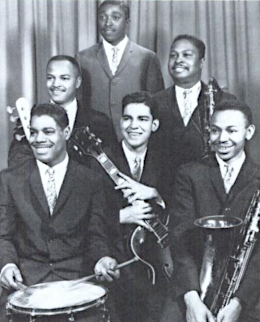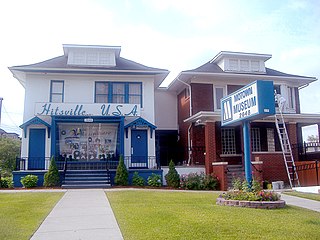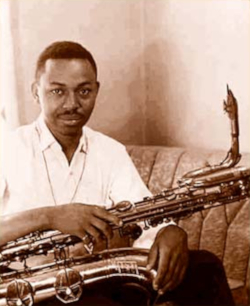Motown is an American record label owned by the Universal Music Group. It was founded by Berry Gordy Jr. as Tamla Records on January 12, 1959, and incorporated as Motown Record Corporation on April 14, 1960. Its name, a portmanteau of motor and town, has become a nickname for Detroit, where the label was originally headquartered.

Charles Edwin Hatcher , known by his stage name Edwin Starr, was an American singer and songwriter. He is best remembered for his Norman Whitfield-produced Motown singles of the 1970s, most notably the number-one hit "War".
Golden World Records was a record label owned by Eddie Wingate and Joanne Bratton. The recording studio was located in Detroit, Michigan, United States. The studio's national hits included "Oh How Happy" by Shades of Blue and "(Just Like) Romeo and Juliet" by The Reflections. The early, pre-Motown songs of Edwin Starr, such as "Agent Double-O-Soul", were recorded at the Golden World studio.

Berry Gordy III, known professionally as Berry Gordy Jr., is an American retired record executive, record producer, songwriter, film producer and television producer. He is best known as the founder of the Motown record label and its subsidiaries, which was the highest-earning African-American business for decades.

The Funk Brothers were a group of Detroit-based session musicians who performed the backing to most Motown recordings from 1959 until the company moved to Los Angeles in 1972.

"Hitsville U.S.A." is the nickname given to Motown's first headquarters and recording studio. The house is located at 2648 West Grand Boulevard in Detroit, Michigan, near the New Center area. The house was purchased by Motown founder Berry Gordy in 1959.
The Flaming Ember was an American soul band from Detroit, Michigan, United States, who found commercial success starting in the late 1960s.
Johnny Bratton, also known as Honey Boy Bratton, was an American professional boxer and briefly reigned as the NBA welterweight champion in 1951. He fought many of the best fighters of his era in the division, earning nearly $400,000 in 83 fights, but ended up penniless and mentally impaired.
The San Remo Golden Strings were a studio group from Detroit, Michigan. A number of its members also played in the Detroit Symphony Orchestra, while others were members of the Motown backing band, The Funk Brothers. Their albums were released on Ric-Tic, Motown and Gordy labels. They scored two hits in the U.S. in 1965: "Hungry for Love" and "I'm Satisfied". In 1971, they had some success, as the "San Remo Strings" with "Festival Time", which reached #39 in the UK Singles Chart and was popular on the UK's Northern soul music scene.
Gwen Fuqua was an American businesswoman, songwriter and composer, most notably writing hit songs such as "Lonely Teardrops", "All I Could Do Was Cry" and "Distant Lover". She acquired her full name after marrying Harvey Fuqua and kept the name after their divorce.
The Gordys are an African-American family of businesspeople and music industry executives. They were born to Georgia-reared parents Berry "Pops" Gordy Sr. and Bertha Gordy and raised in Detroit, where most of the siblings played a pivotal role in the international acceptance of rhythm and blues music as a crossover phenomenon in the 1960s. The accomplishment is attributable to the creation of Motown, a company founded by the seventh-oldest sibling, Berry Gordy Jr..
The Fantastic Four were a Detroit based soul group, formed in 1965. "Sweet" James Epps, brothers Ralph and Joseph Pruitt, and Wallace "Toby" Childs were the original members. Childs and Ralph Pruitt later departed, and were replaced by Cleveland Horne and Ernest Newsome.

Richard Wayne Wylie, often known as Popcorn Wylie, was an American pianist, bandleader, songwriter, occasional singer, and record producer who was influential in the early years of Motown Records and was later known for his work on many records in the Northern soul genre.
Freddie Gorman was an American musician and record producer, most famous as a singer, songwriter for the Motown label in the late 1960s and mid 1970s.
Ric-Tic Records was a record label set up in the 1960s in Detroit, Michigan, United States by Joanne Bratton and Eddie Wingate. Twinned with the Golden World label, Ric-Tic featured many soul music artists and was seen as an early competitor for fellow Detroit label Motown. Motown's owner, Berry Gordy was unhappy with the success of Ric-Tic and in 1968 paid $1 million for the signature of many of the label's artists.
Rose Battiste was an American rhythm and blues singer from 1960s Detroit, Michigan, United States. Her best known tracks were "I Miss My Baby" written by Richard Parker as "D. Peoples", and "Hit And Run". In 1970, Ian Levine brought records from the U.S. to England, including Rose Battiste's "Hit and Run". Battiste was filmed performing at the Blackpool Mecca for the video collection The Strange World of Northern Soul by Ian Levine. She drew a following after being rediscovered in England during the Northern soul movement.

Harvey Fuqua was an American R&B singer, songwriter, record producer, and record label executive.
Anna Ruby Gaye was an American businesswoman, composer and songwriter. An elder sister of Motown founder Berry Gordy, she became a record executive in the mid-to-late 1950s distributing records released on Checker and Gone Records before forming the Anna label with Billy Davis and her sister Gwen Gordy Fuqua. Gordy later became known as a songwriter for several hits including the Originals' "Baby, I'm for Real", and at least two songs on Marvin Gaye's What's Going On album. The first wife of Gaye, their turbulent marriage later served as inspiration for Gaye's 15th studio album, Here, My Dear.
"Just Another Lonely Night" is a 1965 song co-written and co-produced by William "Mickey" Stevenson and Ivy Jo Hunter. It was recorded by four Motown acts: The Temptations, Brenda Holloway, The Four Tops, and The Fantastic Four.

Andrew Alexander "Mike" Terry was an American saxophonist, songwriter, arranger, producer and musical director. His baritone sax solos feature on the breakthrough hits of Martha and the Vandellas, and The Supremes. As a member of the Funk Brothers he performed on thousands of Motown recordings from 1960 to 1967, including at least seven US #1 hits. As was Motown's policy at the time, none of the studio musicians were credited by name. Terry was the musical arranger of the 1966 hit "Cool Jerk" by The Capitols, and later became a record producer, with partners including George Clinton, Sidney Barnes, and Jack Ashford.






